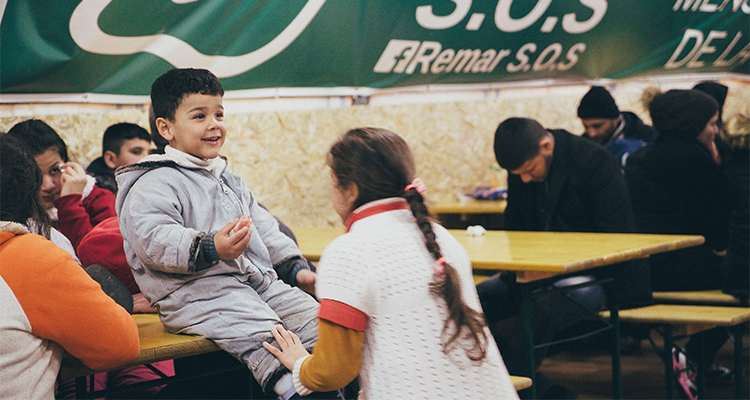A refugee story: Flight from Damascus

At midnight of March 20, 2016, the European Union - Turkey Migrant Deal officially went into effect. The agreement closed the borders that had given 1.5 million people the opportunity to escape their war-torn countries and seek peace and freedom in Europe.
Dorothy Tarrant, a UK native and long-term volunteer/retired director of Veritas in Romania, was helping the Central Europe Field Nazarene refugee response in Sid, Serbia.
The following excerpts are from her journal.
Lydia* is 30 years old, tall and slim and rather distinguished looking. A lawyer who speaks English well, she comes from a small town in Syria near the border with Lebanon, but her work requires her to be in Damascus a lot, as that is where the high court is.
The deteriorating situation in the country has brought her career to a standstill – courts are barely functioning and people do not have money to pay lawyers. Her office was destroyed by a bomb, so Lydia and her husband decided make their way to Germany.
They set off with a group of friends and relatives, but at some point along the way, Lydia developed an infection in her leg. She was advised by doctors to get some treatment and rest for a few days.
Thus she lost touch with her travelling companions. They all made it to Germany before the borders closed. She seems to have a very positive attitude, believing that whatever has happened to her, God has allowed and that her future is in God’s hands.
Although she would like to continue her career in law when she reaches Germany, she’s thinking that this might be the time to take a break from her career and have a baby or two – if she ever gets to join her husband.
Lydia showed me a tiny notebook where she had written a number of words and phrases in German that she had looked up online. She read them out to me, and her pronunciation was not very accurate. I suggested she needed a German teacher, and I would be happy to give her a lesson every day.
******
We’ve had two lessons so far, and it’s been fun. She is an eager learner, and very grateful for the personal attention. The lessons are an excuse for building our relationship.
After introducing her to some common German verbs, we sat chatting and I asked her if she had enjoyed any hobbies in Syria.
“I used to play tennis,” she said. “I gave that up four years ago after I was shot at on my way to the tennis court. I used to carry my racquet over my shoulder in a case, and they probably thought I was carrying a gun. Sometimes men from the rebel armies disguise themselves as women, with a headscarf. Because I am so tall maybe they thought I was a man with a gun. Anyway, not long after, the bombs destroyed the tennis court.”
I hope she gets to play tennis again when she finds a new home in a country that is at peace.
******
On Sunday, as we were getting ready for our Easter service, a young woman told me that Lydia was sick and offered to take me to the motel room which she shares with three other women and four children.
Lydia was hooked up to an IV – she has been unable to keep anything down, not even water, and had become severely hydrated. A doctor came to check on her while I was there and told me he was worried she had pancreatitis.
Later in the day, I went back for a longer visit, taking a bouquet of daffodils and bluebells. Lydia knew about Easter – in Syria she had some Christian friends, so was familiar with the stories of Jesus.
She asked how I would celebrate Easter at home and talked about when she had gone with her friends to church at Christmas. She had once visited a convent that she felt was a particularly serene place. She talked about feeling close to the Virgin Mary, who, as a woman, experienced much suffering in her life.
Before I left I asked if I could pray with her – for healing, for peace, for the opportunity to continue her journey and join her husband, for the knowledge that God is with her on the journey. When I opened my eyes, I could see tears in her eyes as she thanked me for the prayer.
I really, really hoped that I would hear she had made a remarkable recovery, but later found out she was sent to the hospital.
I never did see Lydia again after our lovely conversation on Easter Sunday afternoon. When I tried to visit her again, no one answered the door. A few days later, I discovered she had continued her travels. I was so disappointed. I had wanted to give her a New Testament to give her strength for her journey. We had exchanged email addresses, so I have written to her and hope I will hear from her once she reaches a more stable destination. Her hope was to join her husband in Germany.
Those of us volunteering with Remar at the camp came to care deeply for those with whom we were building relationships. I do believe that this was an answer to prayer – that Jesus was loving these new friends through us, and they could sense that. And we tried to let them know that we were there and were able to care for them because of Issa – Jesus Messiah.
*Name changed for security.
